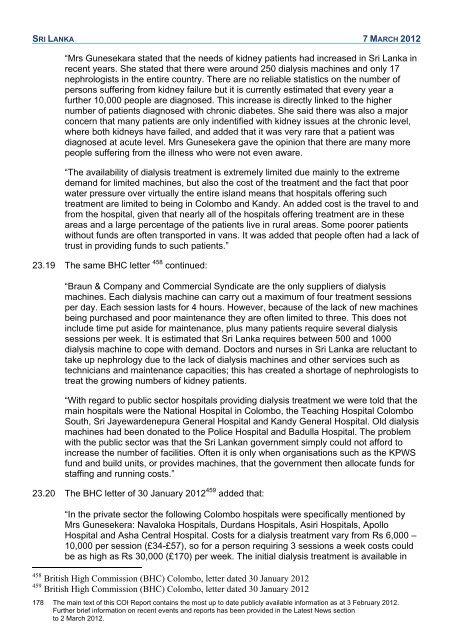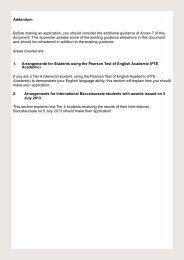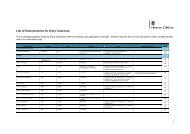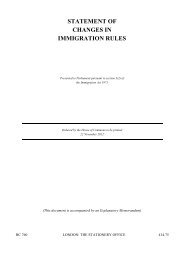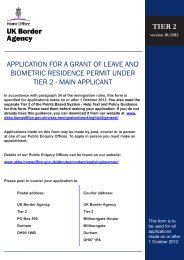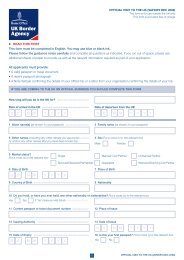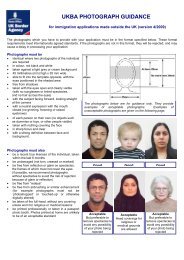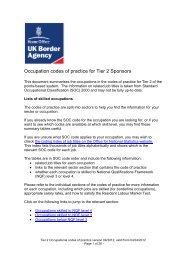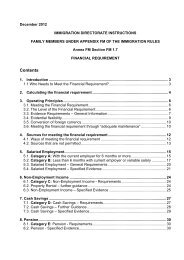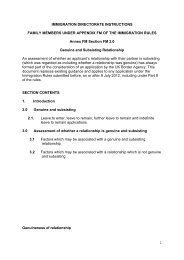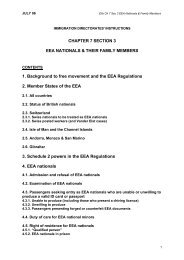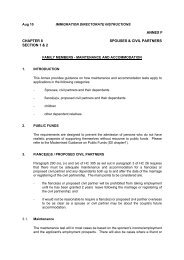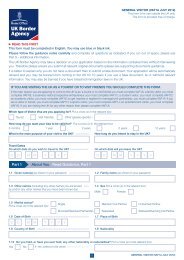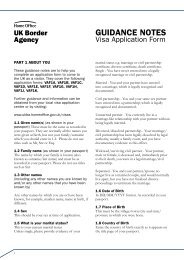COI Report March 2012 - UK Border Agency - Home Office
COI Report March 2012 - UK Border Agency - Home Office
COI Report March 2012 - UK Border Agency - Home Office
You also want an ePaper? Increase the reach of your titles
YUMPU automatically turns print PDFs into web optimized ePapers that Google loves.
SRI LANKA 7 MARCH <strong>2012</strong><br />
―Mrs Gunesekara stated that the needs of kidney patients had increased in Sri Lanka in<br />
recent years. She stated that there were around 250 dialysis machines and only 17<br />
nephrologists in the entire country. There are no reliable statistics on the number of<br />
persons suffering from kidney failure but it is currently estimated that every year a<br />
further 10,000 people are diagnosed. This increase is directly linked to the higher<br />
number of patients diagnosed with chronic diabetes. She said there was also a major<br />
concern that many patients are only indentified with kidney issues at the chronic level,<br />
where both kidneys have failed, and added that it was very rare that a patient was<br />
diagnosed at acute level. Mrs Gunesekera gave the opinion that there are many more<br />
people suffering from the illness who were not even aware.<br />
―The availability of dialysis treatment is extremely limited due mainly to the extreme<br />
demand for limited machines, but also the cost of the treatment and the fact that poor<br />
water pressure over virtually the entire island means that hospitals offering such<br />
treatment are limited to being in Colombo and Kandy. An added cost is the travel to and<br />
from the hospital, given that nearly all of the hospitals offering treatment are in these<br />
areas and a large percentage of the patients live in rural areas. Some poorer patients<br />
without funds are often transported in vans. It was added that people often had a lack of<br />
trust in providing funds to such patients.‖<br />
23.19 The same BHC letter 458 continued:<br />
―Braun & Company and Commercial Syndicate are the only suppliers of dialysis<br />
machines. Each dialysis machine can carry out a maximum of four treatment sessions<br />
per day. Each session lasts for 4 hours. However, because of the lack of new machines<br />
being purchased and poor maintenance they are often limited to three. This does not<br />
include time put aside for maintenance, plus many patients require several dialysis<br />
sessions per week. It is estimated that Sri Lanka requires between 500 and 1000<br />
dialysis machine to cope with demand. Doctors and nurses in Sri Lanka are reluctant to<br />
take up nephrology due to the lack of dialysis machines and other services such as<br />
technicians and maintenance capacities; this has created a shortage of nephrologists to<br />
treat the growing numbers of kidney patients.<br />
―With regard to public sector hospitals providing dialysis treatment we were told that the<br />
main hospitals were the National Hospital in Colombo, the Teaching Hospital Colombo<br />
South, Sri Jayewardenepura General Hospital and Kandy General Hospital. Old dialysis<br />
machines had been donated to the Police Hospital and Badulla Hospital. The problem<br />
with the public sector was that the Sri Lankan government simply could not afford to<br />
increase the number of facilities. Often it is only when organisations such as the KPWS<br />
fund and build units, or provides machines, that the government then allocate funds for<br />
staffing and running costs.‖<br />
23.20 The BHC letter of 30 January <strong>2012</strong> 459 added that:<br />
―In the private sector the following Colombo hospitals were specifically mentioned by<br />
Mrs Gunesekera: Navaloka Hospitals, Durdans Hospitals, Asiri Hospitals, Apollo<br />
Hospital and Asha Central Hospital. Costs for a dialysis treatment vary from Rs 6,000 –<br />
10,000 per session (£34-£57), so for a person requiring 3 sessions a week costs could<br />
be as high as Rs 30,000 (£170) per week. The initial dialysis treatment is available in<br />
458 British High Commission (BHC) Colombo, letter dated 30 January <strong>2012</strong><br />
459 British High Commission (BHC) Colombo, letter dated 30 January <strong>2012</strong><br />
178 The main text of this <strong>COI</strong> <strong>Report</strong> contains the most up to date publicly available information as at 3 February <strong>2012</strong>.<br />
Further brief information on recent events and reports has been provided in the Latest News section<br />
to 2 <strong>March</strong> <strong>2012</strong>.


